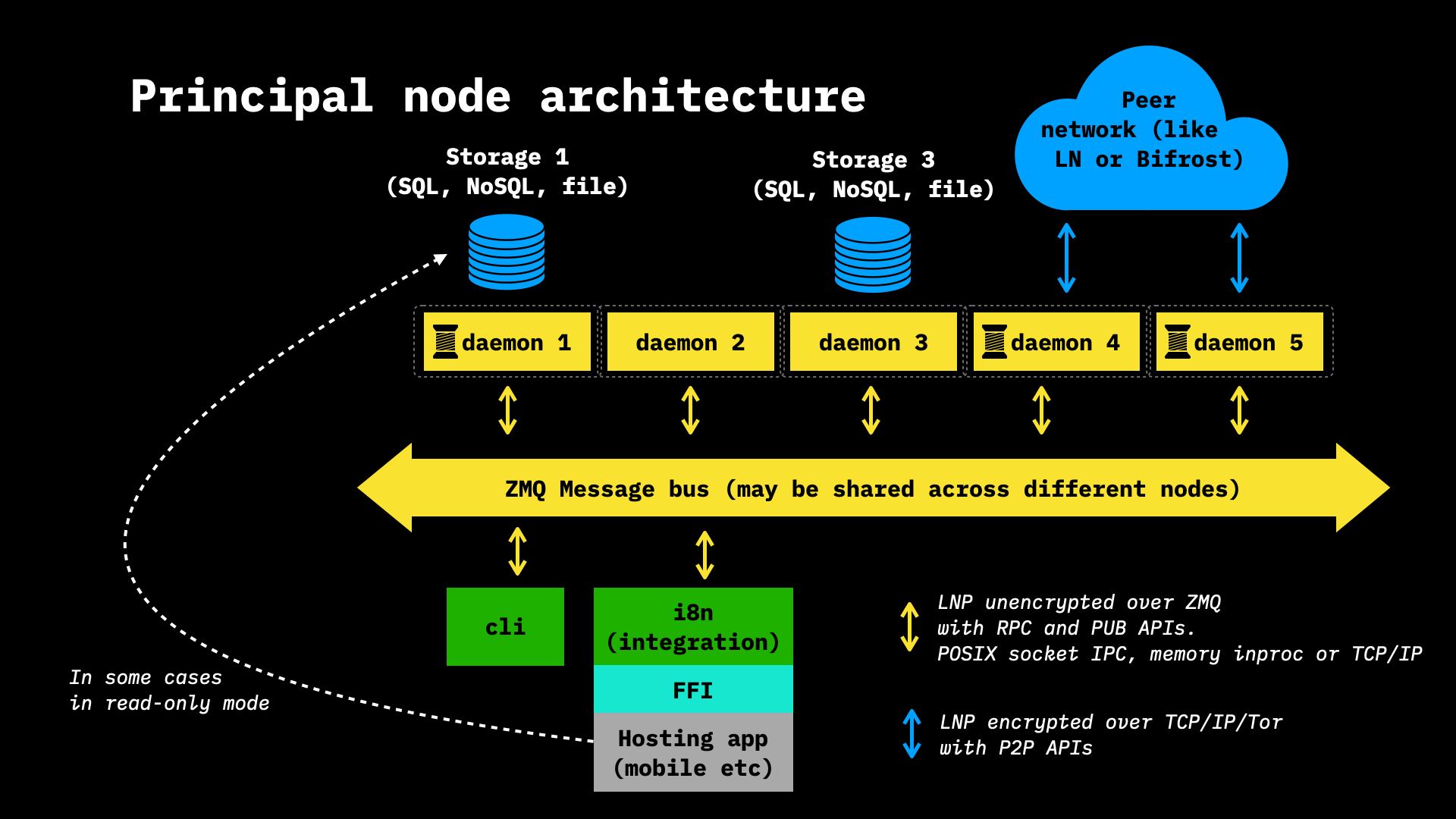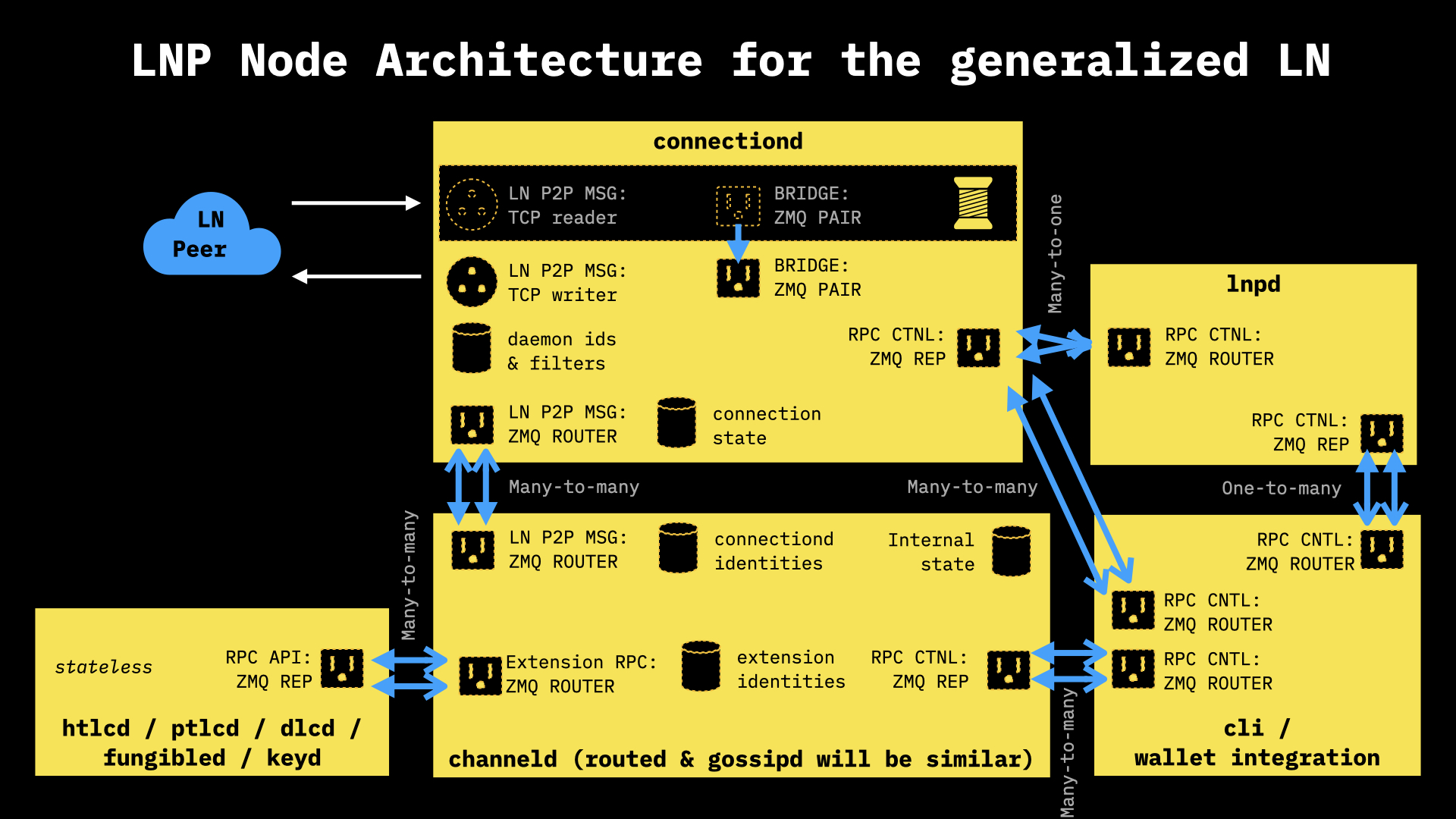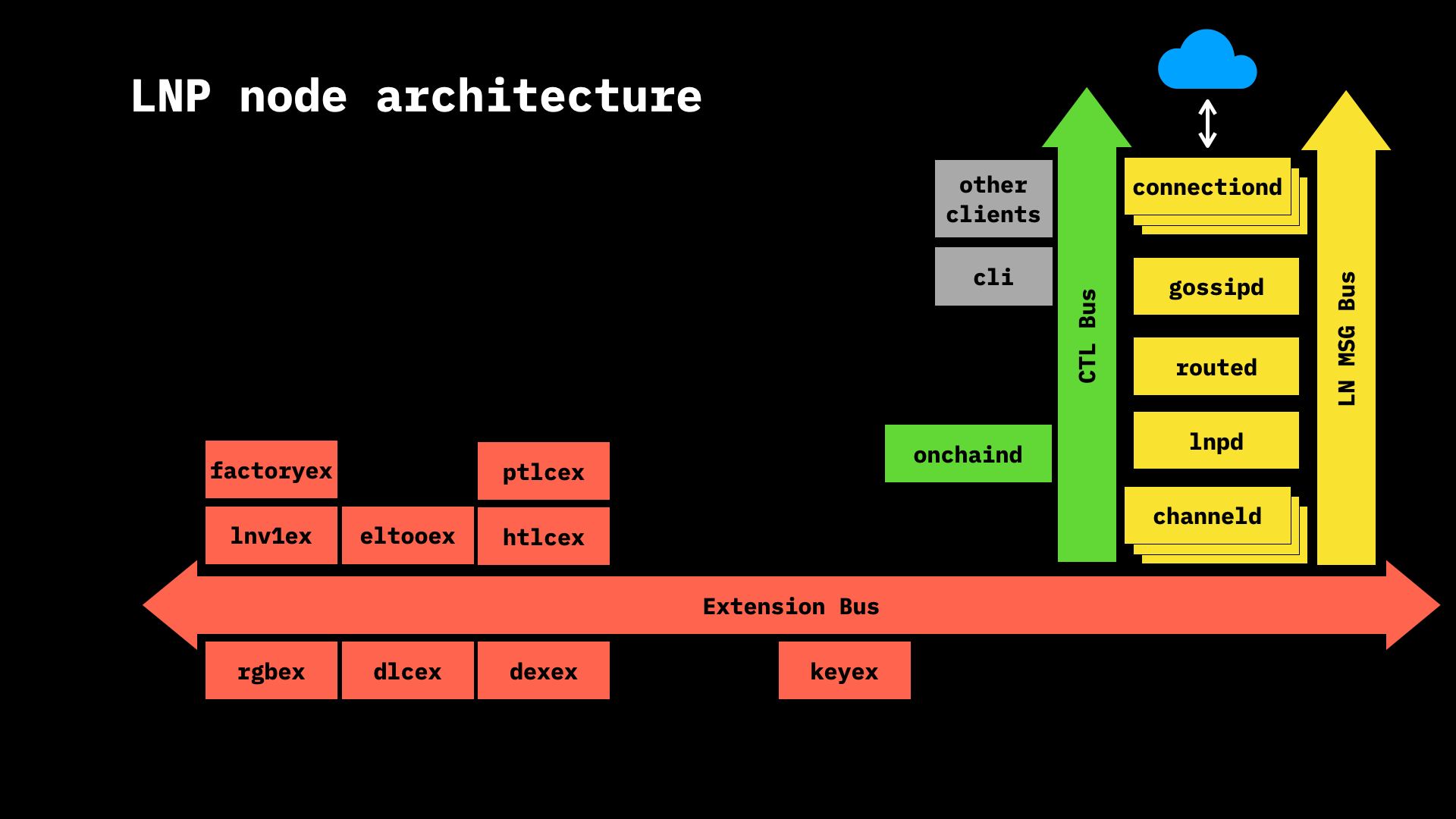LNP Node is a new Lightning Network node written from scratch in Rust. Actually, it's a suite of daemons/microservices able to run both Lightning Network (LN) as it is defined in BOLT standards - and generalized lightning codenamed "Bifrost": a full refactoring of the lightning network protocols supporting Taproot, Schnorr signatures, RGB assets, DLCs, multi-peer channels, channel factories/channel composability and many other advanced features. LNP Node operates using Internet2 networking protocols and specially-designed microservice architecture.
One may ask: another LN node? Why we need it? And what is this lightning network protocol (LNP), and Internet2 networking and generalization of lightning channels coming with Bifrost?
Lightning Network Protocol is unification of both "normal" (or "legacy") Lightning network and Bifrost: a family of protocols operating on top of bitcoin protocols (BP) and together composing family of LNP/BP tech stack.
Internet2 is a set of best practices to use existing protocols in network communications preserving most of privacy and anonymity. It supports both P2P and RCP (client-server) operations and represents lightning-styled Noise_XK encrypted communications (instead of SSL/TLS) for P2P and encrypted ZeroMQ for client-server communications. This allows to avoid most common pitfalls with centralized certificate authorities or plain-text low-efficiency JSON/XML RPC or web service protocols. P2P layer is an extract from BOLT-8 and, partially, BOLT-1, extended to support arbitrary messaging, RPC, P2P and publish/ subscribe APIs over TCP/IP, TCP/Tor, UDP, ZeroMQ and high latency communication channels (mesh/satellite networks) with end-to-end encryption. It is 100% LN compatible (and in these terms Lightning Network runs on this protocol de-facto) but allows much more than current LN uses. The protocol is defined as a set of LNPBP15-19 standards, which are strict extensions of BOLTs. In other words, with this protocol you can do an arbitrary messaging (and build complex distributed systems without central authorities like DNS, SSL, IP addresses), so at LNP/BP Association we use it everywhere, even for internal communications between microservices.
Bifrost is a way of defining payment channels in a modular and extensible way such that you can easily add new transaction outputs to the commitment transaction, switch from HTLCs to PTLCs payments, use taproot & do a lot of experimentation without inventing new messages and standards each time: peers are using Bifrost to negotiate channel and transaction structure with partially-signed transactions.
Idea for both protocols came from Dr Maxim Orlovsky, Dr Christian Decker and Giacomo Zucco discussions in 2019-2020 and implemented by Maxim Orlovsky as a part of LNP Core Library. We recommend to watch to Potzblitz about LNP Node and LNP/BP networking presentation to get a deeper insight into these topics. Presentations slides are also avaliable:
- LNP/BP Decentralization Solutions
- Future of the Lightning Network (slides from the Postblitz talk)
The problem with the existing Lightning node implementations is their very limited extensibility for such things as:
- Future LN upgrades (channel factories, payment points, Taproot), since they do not separate network communication, channel operation and channel parameters from each other in a well manner, such that it will be possible, for instance, to replace HTLCs with payment points using some extension/module;
- Protocols on top of LN (layer 3), like RGB, DLCs or proposed Lightspeed protocol, which require modification on the structure of the commitment transaction;
- Custom non-payment channel types, for instance trustless storage with Storm
or computing with Prometheus.
We name the extensions to Lightning network required to build this rich functionality "Bifrost". With this project LNP/BP Standards Association is trying to build an LN node with extensible and highly-modular architecture, utilizing state-of-the-art Rust approaches like:
- Mobile-, cloud & web-ready, due to a specially-designed microservice architecture
- Dockerization for scalability at the level of separate processes (per-channel scalability etc)
- Fast and performant ZeroMQ for APIs and IPCs.
This new node will be used to implement:
- Bidirectional channels
- Channel factories/multipeer channels;
- Payment points;
- DLCs on LN;
- RGB smart contracts (client-validated smart contract system);
- Future Storm – storage & messaging state channels;
- Future Prometheus – high-load computing state channels;
- Lightspeed payment protocol;
- Schnorr's/Taproot.
The node (as other nodes maitained by LNP/BP Standards Association and Pandora Core company subsidiaries) consists of multiple microservices, communicating with each other via ZMQ RPC interfaces.
The set of microservices representing node can run as either:
- single daemon process on desktop or a server;
- cloud of docker-based daemons, one per microservice, with instance scalability and in geo-distributed environment;
- inside a single mobile app as threads;
- and even different nodes can be combined in their services between themselves into a single executables/mobile apps;
- all P2P communications are end-to-end encrypted and work over Tor.
Other nodes, designed an maintained by LNP/BP Standards Association with the same architecture include:
- RGB Node for running RGB smart contracts over bitcoin and lightning network
- BP Node for indexing bitcoin blockchain (you may think of it as a more efficient Electrum server alternative)
Other third parties provide their own nodes:
- MyCitadel Bitcoin, LN & RGB enabled wallet service with support for other LNP/BP protocols;
- Keyring for managing private key accounts, storage and signatures with support for miniscript and PSBTs.
The overall architecture of LNP Node is the following:
More information on the service buses used in the node:
cli/– command line API talking to LNP Node via RPC (see below);rpc/– RPC client library for controlling LNP Node;src/– main node source code:peerd/– daemon managing peer connections within Lightning peer network using LNP (Lightning network protocol).;channeld– daemon managing generalized Lightning channels with their extensions;lnpd– daemon initializing creation of new channels and connections;routed– daemon managing routing & gossips;watchd– daemon watching on-chain transaction status;signd- key managing for key derivation & signatures; uses Descriptor Wallet lib.
Each daemon (more correctly "microservice", as it can run as a thread, not necessary a process) or other binary (like CLI tool) follows the same organization concept for module/file names:
error.rs– daemon-specific error types;opts.rs– CLAP arguments & daemon configuration data;runtime.rs– singleton managing main daemon thread and keeping all ZMQ/P2P connections and sockets; receiving and processing messages through them;automata/- state machines implementing different operation workflows;index/,storage/,cache/– storage interfaces and engines;db/– SQL-specific schema and code, if needed.
To compile the node, please install cargo
sudo apt install -y build-essential
cargo install --path . --locked --all-featuresBefore running the node, it is necessary to set an xpriv to create a funding wallet:
lnpd -vvv init
# The prompt shows something like this:
Initializing node data
Data directory '/[DATA_DIR]/.lnp_node/signet' ... found
Signing account 'master.key' ... creating
Please enter your master xpriv:
To compile the node, please install cargo, then run the following commands:
sudo apt install -y build-essential cmake libsqlite3-dev libssl-dev libzmq3-dev pkg-config
cargo install --path . --locked --all-features
lnpd -vvvdocker build -t lnp-node .
docker run --rm --name lnp_node lnp-node- IRC channels on Freenode
- #lnp-bp: discussions on this and other LNP/BP projects
- #rust-bitcoin: here you can get general support on rust-lightning
- #lightning-dev: here better to ask generic lightning-network questions
- dr_orlovsky: my account on IRC
- Lightning Hackdays Mattermost channel: https://mm.fulmo.org/fulmo/channels/x-rust-ln-node


